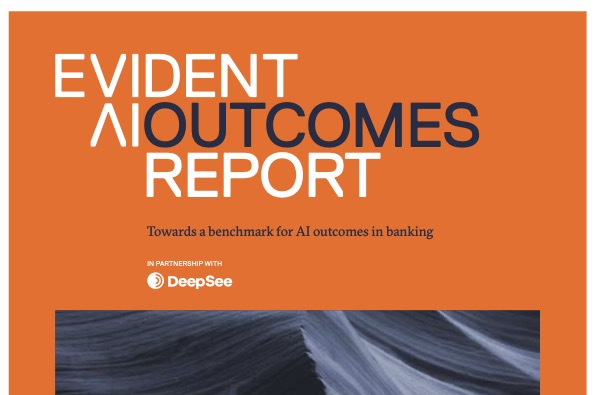
AI teams focusing on five areas ahead of accelerating AI rollouts next year
AI has the potential to radically transform at least 100 different everyday banking processes and create value across five core areas, according to a new report by benchmarking AI platform Evident.
As the race for AI adoption in banking intensifies, the report shows how leading banks are identifying AI use cases, creating internal structures to support mass rollouts, and establishing what will give them the highest return on investment.
The Evident AI Outcomes Report is based on conversations with senior executives from 30 of the world’s biggest banks alongside extensive analysis of 50 banks’ publicly available communications regarding AI use cases.
It identifies five different areas in which AI use cases can drive value for the banks:
- Income uplift
- Efficiency gains/net cost reduction
- Risk reduction/avoidance
- Customer satisfaction
- Staff satisfaction.
Within these areas, the report highlights 100 initial AI ‘use case families’ emerging within the banks across 14 core banking functions, including credit scoring, customer acquisition and fraud detection.
According to Evident, a number of banks are now publicly reporting the total number of AI use cases in production, as well as the ROI from these use cases – an indication of growing AI maturity. For example, Société Générale already has 340 data and AI use cases in production, with an expected value creation of EUR 500m, while DBS Bank has yielded a revenue uplift of more than USD 100m across its 300 AI and machine learning projects. BNP Paribas has already rolled out more than 700 use cases with the goal of creating value of EUR 500m by 2025, and JPMorgan Chase has more than 300 use cases in production, with an overall target of delivering USD 1bn of business value through AI.*
Evident Co-founder and Co-CEO Annabel Ayles said:
“Use cases are the building blocks of AI adoption and, over the course of 2023, AI leaders in banks have been inundated with new ideas from their teams, driven in part by the mindset shift instilled by ChatGPT. Many banks have established central AI leadership teams to orchestrate and support these activities. However, it’s not easy or obvious to determine which AI use cases will deliver the best outcomes, and teams face growing pressure to make the right choices, demonstrate ROI, and set up the optimal processes to scale AI rollouts next year.
“They also need to find a balance between ‘over-governance’ from the centre, and enabling the business units to continue to innovate. The banks that get this right have the opportunity to fundamentally change how their organisations operate as they successfully scale AI across the business.”
Produced in collaboration with AI-based knowledge process automation provider DeepSee.ai, Evident’s report marks the first step on a journey towards benchmarking AI outcomes across the banks.
It identifies five priority areas in which banks are focused on building capabilities, in readiness for mass AI rollouts next year and beyond:
- MAP current, and potential, AI use cases
- MEASURE the value of those use cases in terms of outcomes
- IDEATE the most relevant and addressable use cases for the bank
- PRIORITISE which uses cases to pursue
- OPERATIONALISE those use cases to deliver results
Evident’s research also shows that ChatGPT is driving the increased proliferation of potential AI use cases, with leading AI teams investing in initiatives to fuel and harness this bank-wide AI ideation, such as increasing AI literacy, embedding AI teams within the business lines, investing in cross-organisation knowledge sharing amongst AI talent, and establishing central use case ideas libraries.
Steve Shillingford, CEO at DeepSee.ai, said:
“We’ve seen many banks build in-house AI applications that are unique to their environments, however, they don’t scale well and don’t respond to changing requirements well. The best banks know where they should build and where they should buy – it’s a mixed approach. As adoption of AI continues to accelerate, we will see banks leverage AI to develop deeper analysis engines. In highly-regulated environments specifically, this means having visibility into everything that’s happening. When it comes to operationalising complex work, AI must ingest, synthesise, and summarise dense information – then apply the necessary context and domain knowledge to meet regulatory and line of business requirements.”
Alexandra Mousavizadeh, Evident Co-Founder and CEO, said:
“With an ever-increasing focus on ROI from their AI spend, banks are doubling-down on optimising their processes to reduce the time it takes to get to outcomes. These five core areas are critical for banks to master in order to drive value from AI.”
*While making direct comparisons across the banks is challenging, given the different definitions and calculation methodologies at play, this is undoubtedly a marker of AI maturity as these banks will have had to evolve a common methodology for identifying, tracking and measuring use cases internally.
